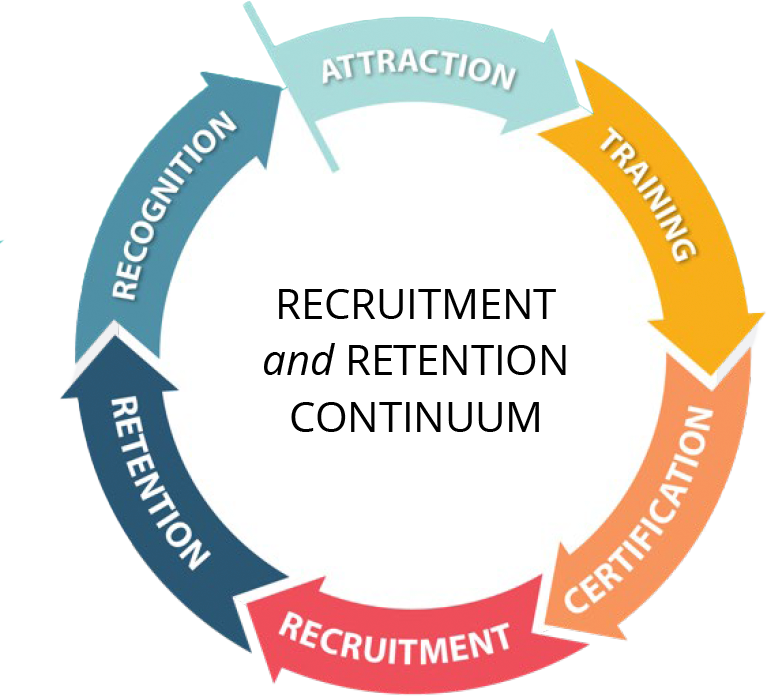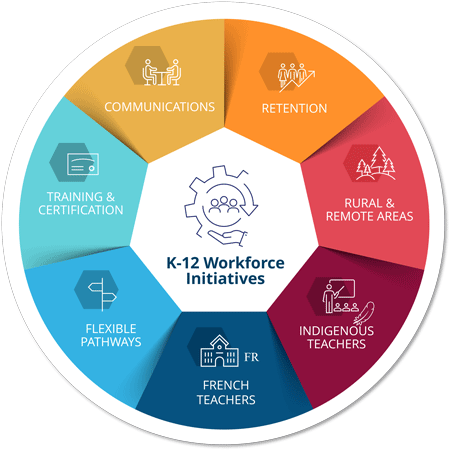Strengthening and supporting B.C.'s K-12 workforce

On this page
The K-12 Workforce Plan
The Province is committed to working with education sector partners to support a stable, qualified, and engaged K-12 workforce while helping students learn and thrive.
The K-12 Workforce Plan is intended to support all stages of the recruitment and retention continuum, from attraction to the workforce to training, certification, recruitment, retention and recognition.

The key priorities of B.C.’s K-12 Workforce Plan are:
- Supporting retention through adult well-being and professional growth
- Offering flexible, accessible, and robust post-secondary education and career pathways
- Attracting diverse talents and individuals into K-12 careers
- Fostering cross-sector collaboration for an agile education system
Click to view and download the full K-12 Workforce Plan (PDF, 270KB)
K-12 workforce initiatives
Learn about the work happening as part of the K-12 Workforce Plan below.

Retention
Empowering and supporting educators at every stage of their career by expanding and enhancing learning opportunities for the K-12 workforce including the provincial teacher mentorship program.
Rural and remote areas
Providing targeted supports such as teacher hiring incentives to districts facing the greatest recruitment challenges and practicum placement awards to support more student teachers to complete their practicums in northern rural and remote schools.
Indigenous teachers
Action 4.02 of the Declaration on the Rights of Indigenous Peoples Act Action Plan calls on the province to “develop and implement an effective recruitment and retention strategy to increase the number of Indigenous teachers in the K-12 public education system.” The Ministry of Education and Child Care, Ministry of Post-Secondary Education and Future Skills, the First Nations Education Steering Committee, and the Indigenous Adult and Higher Learning Association have established a Working Group to implement a strategy specific to First Nations teachers, consistent with a distinctions-based approach. The Ministry of Education and Child Care is also working with Métis Nation BC on a strategy to support the recruitment and retention of Métis teachers.
French teachers
Strengthening French minority and second-language education programs by supporting the recruitment, development, and retention of French-speaking educators through initiatives such as recruitment campaigns and expansion of seats in French teacher education programs at B.C. post-secondary institutions.
Flexible pathways
Building flexible pathways to teacher certification and enhancing access to teacher education by expanding online/hybrid programs to enable students to complete their studies within their own communities and continue working in schools (e.g., as support staff, holders of a Letter of Permission) while studying.
Training and certification
Supporting education professionals in gaining necessary skills and credentials to help students thrive. Streamlining the immigration and certification processes for teachers who have been educated internationally so they can join B.C.’s workforce more promptly.
Communications
Multiple working groups with representation from across the K-12 sector are meeting regularly to enhance cross-sector collaboration and communication while allowing the province to respond to emerging needs and priorities for the K-12 workforce.
Stay informed on the latest developments in the K-12 Workforce Plan. Visit the News and Updates page to learn about progress and impacts of K-12 workforce initiatives.
K-12 workforce partners
![]()
Representatives from Indigenous organizations, school districts, independent schools, unions, post-secondary institutions, the BC Teachers’ Council and the provincial government have worked together to develop the K-12 Workforce Plan.
K-12 workforce partners
-
Human Service Deans and Directors
-
Federation of Independent School Associations of British Columbia (FISA BC)
-
Ministry of Post Secondary Education and Future Skills (PSFS)
